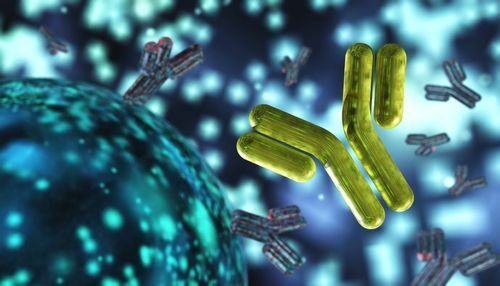KappaMab, an Antibody, Shows Safety and Hints of Efficacy in Myeloma Patients in Early Trial

KappaMab (MDX-1097), a new monoclonal antibody that binds to the kappa myeloma antigen, has a favorable safety profile in multiple myeloma patients with excess kappa light chain, results of a pilot study suggest.
The data were published in Blood Cancer Journal in a paper titled, “A preliminary study of the anti-κ myeloma antigen monoclonal antibody KappaMab (MDX-1097) in pretreated patients with κ-restricted multiple myeloma.”
Antibodies are proteins made by the immune system that are able to bind to a particular molecular target — called an antigen — with extreme specificity. In the context of myeloma treatments, antibodies can be manufactured so that they specifically bind to an antigen present on cancer cells but, ideally, not on healthy cells.
Researchers conducted a Phase 1 clinical trial (ACTRN12608000336381) to assess the safety profile of one such antibody: KappaMab, so called because it binds to a particular form of the protein kappa myeloma antigen (KMA). KMA is expressed by some types of myeloma cells but not by healthy immune cells, making it a potentially useful target for cancer therapy.
In the trial, 12 people who had previously undergone at least two rounds of therapy, and had persistent but stable disease, were given a single intravenous infusion of KappaMab at one of four doses (three patients per dose): 0.3, 1.0, 3.0, and 10.0 mg/kg.
They were followed for up to 135 days to evaluate the safety of this infusion; the trial was not designed to evaluate effectiveness.
No serious adverse events or toxicities were reported in any of the patients, and the maximum tolerated dose was not reached.
The most common treatment-related side effect was nausea, affecting two of the three patients given the highest dose. One patient in the 10 mg/kg group experienced nausea and shortness of breath during the infusion; the infusion was paused, the symptoms resolved on their own, and the infusion was completed without further incident. Another experienced nausea, gas, and pain in the extremities, which began a few days after the infusion and lasted for a week or two before clearing up without further treatment.
Interestingly, although “no conventional disease responses were observed,” one patient (in the 3.0 mg/kg group) did have evidence of reduced tumor growth based on PET scans. This person also had symptom improvement, including less bone pain and better kidney function, that lasted for three months after the infusion.
Across the patients, there were dose-dependent decreases in levels of some signaling molecules known to help drive myeloma cell growth and survival.
Again, this study was not designed to test efficacy; as such, no conclusions about treatment effectiveness can reliably be drawn from these data. But results do suggest that the antibody is safe at doses up to 10 mg/kg.
Further studies evaluating the efficacy of KappaMab, alone and in combination with other myeloma therapies, are ongoing and will be needed to assess this antibody’s effectiveness as a multiple myeloma therapy.
HaemaLogiX, previously known as Immune System Therapeutics, is developing KappaMab as a possible myeloma treatment. One of this study’s nine authors is employed by HaemaLogiX.






